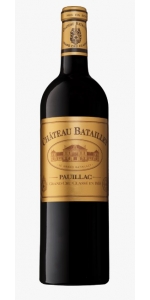Wine from Batailley
The name "Batailley" would come from the "Battle" which took place in 1453 between the French and the English on the lands of the future domain; with the reconquest of Château Latour by the French, this year saw the end of the Hundred Years War. Château Batailley is one of the oldest residences in the town of Pauillac. Vines have been planted on this land rich in history since the 17th century. In the 18th century, three brothers and sisters of the Saint-Martin family, originally from Pauillac, acquired the estate.
In 1791, the two sisters sold their shares to Guillaume Pécholier, a Bordeaux wine merchant. In 1816, Daniel Guestier, from the trading company Barton & Guestier, bought the Château, modernized it, increased the surface area of the vineyard and improved the quality of the wine. His son succeeded him in 1847. It is the Guestier family who would have asked Jean-Pierre Barillet-Deschamps, landscape architect of Napoleon III, to design the 6-hectare park. In 1866, the Parisian banker Constant Halphen acquired the property.
In 1855, Château Batailley was classified in the Fifth Grand Cru category of the Médoc, thanks in particular to the improvements made by Daniel Guestier. The Classification of the Médoc was set up at the request of Napoleon III by the wine merchants of Bordeaux within the framework of the Universal Exhibition of Paris in 1855. It was developed according to the value of the wines, but also the reputation of the Châteaux.
Chateau Batailley Grand Cru is made from 78% Cabernet Sauvignon, 19% Merlot, 2% Petit Verdot & 1% Cabernet Franc.
Château Batailley is a winery in the Pauillac appellation of the Bordeaux region of France. The wine produced at the estate was classified as one of eighteen Cinquièmes Crus (Fifth Growths) in the Bordeaux Wine Official Classification of 1855.
Garnet-purple colour. Rich and expressive nose, fruity with notes of spices, smoke and vanilla. On the palate, this wine is supple, round, well balanced, with good acidity, a nice fruitiness and nice notes of leather and cedar. Long elegant finish.
Review:
The 2010 Batailley repeated its magnificent showing when poured at the chateau. It has a detailed bouquet of blackberry and cedar, quite backward and seemingly having advanced lite since | tasted in in April 2016. The palate remains full of tension and brimming with energy, delivering classic cedar and tobacco notes toward the persistent finish. Batailley can produce wines that live many decades, and this is clearly one of them. Tasted at the property. Drink 2020-2050
- Neal Martin Vinous 95 Points
- back
Selected Options
Wineries
Categories
Pricing
Countries
Regions
Grape Types
Wineries
Organic/Free Shipping
Fenocchio DOC Barbera d'Alba Superiore Bussia is made from 100 percent Barbera.
The color is a deep ruby red with garnet reflections. It has a rather intense bouquet, with scents typical of the vine and a full bodied and dry flavor, with a distinct and pleasing acidity. It becomes mature with aging, acquiring a full and balanced flavor.
Parcel is 2.5 hectares (6.2 acres) planted at 300 meters above sea level.
It pairs well with red and white meats, tagliatelle pasta and cheeses.
Maison Chapoutier Chateauneuf-du-Pape La Bernardine 2021 is made from 75% Grenache, 15% Syrah, 10% Mourvèdre.
Intense crimson-red in color with a complex but subtle nose of blackcurrant and plum followed by roasted coffee, cinnamon, and cherry. On the palate, it opens into spice, licorice and fruity notes.
Review:
A textural, refined and velvety Chateauneuf-du-Pape with aromas of forest berries, wet stones, roasted meat, wild herbs and some bark. It’s medium- to full-bodied with fine, firm tannins. There is a refined texture here, silky at the center, with a delicate core of dark cherries challenged by an intense array of spices that provide verve and energy.
-James Suckling 93 Points





